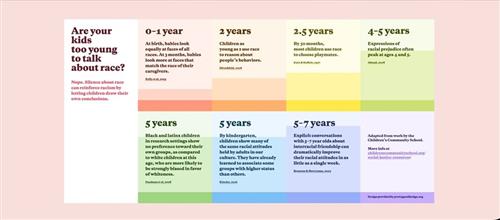-
Parent Resources for Talking to Children about Racism

Image by prettygooddesign.com
General suggestions when having conversations with children:
Sometimes children want more information than we are able to share or that we actually know. Here are some phrases that might help.
- “It sounds like you are sad” (angry, confused, frustrated, etc).” (affirming feelings)
- “I don’t know the answer to that.” (if you don’t or if you are not sure: then focus back on feelings)
- “It’s hard when we don’t know all the facts.” (truth telling but not stating more than we’re able to tell)
- “We have to respect the privacy of those affected.” It’s not our news to tell and people will share their news in their way and in their own time.
- “There are a lot of ways to feel and they are all okay.” Sometimes you might feel one way and then you might feel another way later on.
- “There is no one right way to feel or to act after someone dies.”
- “What would you like to do right now (who would you like to talk to) that might help?”
Supporting by Listening Through Grief, Loss, or other strong emotions
- Most often, what people want most is someone to talk to about their experience:
- Someone to care
- Someone to really listen
- Someone to lean on or cry with
- How to let people know you are listening
- Actively listen when someone needs to talk: turn toward the speaker, speak calmly, listen more than speak, summarize, reflect.
- Make eye contact if appropriate and strive for a warm facial expression
- Listen more, talk less
- Your compassionate presence is more important than your words.
- Try not to interrupt.
- When you do speak, do it in a calm, warm tone
- Label, summarize, and mirror the feelings the other person is expressing.
- Do ask questions to clarify.
- Things NOT to say
- I know how you feel. (But it is okay to say, “I feel sad too.”)
- Let’s talk about something else.
- You should work toward getting over this.
- You are strong enough to deal with this.
- You’ll feel better soon.
- You need to relax.
- Also, don’t judge. Questions like “Why?” and “Why not?”and evaluating the worth of what someone else did or didn’t do don’t help.
Behaviors to watch for
Children may show some of these behaviors immediately or days, weeks, or even months after an incident.
- Shock/denial
- Restlessness, anger, aggressive behavior
- Sleeping or eating difficulties
- Headaches, tummy aches, body aches
- Withdrawal
- Sadness, tearfulness
- Poor concentration
- Unexpected fears and worries
- Acting younger than their age
- School avoidance
Helpful links to specifically address the topic of racism
Books/Videos:
- CNN Sesame Street Town Hall Originally aired on 6/6/20
- 31 Children's books to support conversations on race, racism, and resistance EmbraceRace
- Books about Racism and Social Justice Common Sense Meda
- Coretta Scott King Award Winners Common Sense Media
- Social Justice Books by category
- Ms. Flete's Playlist on Embracing Diversity: Several read alouds included (YouTube)
- A Kids Book About Racism by Jelani Memory (YouTube)
- Teaching Your Child About Black History PBS Kids
- How to Talk to Kids About Race The Atlantic
- I Love My Hair Sesame Street
Interviews/Advice from Experts:
- Talking to Children after racial incidents from the Penn GSE Newsroom
- An Activity Book for African American Families: Helping Children Cope with Crisis from the National Black Child Development Institute (NBCDI) and the Eunice Kennedy Shriver National Institute of Child Health and Human Development (NICHD)
- Talking to Kids About Discrimination American Psychological Association
- Social Justice National Association of School Psychologists
- Talking to Kids About Racial Stereotypes Media Smarts
- Activities that Promote Racial and Cultural Awareness PBS
Resource Lists:
- Teaching About Race, Racism, and Police Violence from Teaching Tolerance
- 60+ Resources for Talking to Kids About Racism Bounceback Parenting
- Discussing Difficult Situations with Your Children National PTA
- "Talking About Race" Web Portal National Museum of African American History and Culture







